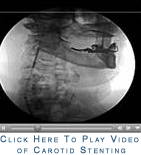Carotid Stenosis
 Carotid stenosis is a narrowing of one or both of the arteries that supply blood to the brain. The narrowing occurs when plaque accumulates at or near the bifurcation of the artery usually at a point midway between the chest and the head. A stroke (one-sided arm or leg weakness, loss of vision, inability or difficulty in talking) occurs when a piece of the plaque breaks off and lodges upstream in a smaller artery in the brain and cuts off its blood supply.
Carotid stenosis is a narrowing of one or both of the arteries that supply blood to the brain. The narrowing occurs when plaque accumulates at or near the bifurcation of the artery usually at a point midway between the chest and the head. A stroke (one-sided arm or leg weakness, loss of vision, inability or difficulty in talking) occurs when a piece of the plaque breaks off and lodges upstream in a smaller artery in the brain and cuts off its blood supply.
If you have had a stroke from carotid stenosis, or if the narrowing is severe even without symptoms, you may require treatment to prevent further strokes. This determination can be made by a reliable ultrasound test followed by a consultation with one of our vascular physicians. Through the Vascular Center, patients with carotid artery disease and stroke are treated by a team of surgeons, endovascular specialists and neurologists dedicated to stroke prevention. Rutgers New Jersey Medical School has a stroke center and numerous medications for the prompt treatment of patients with acute strokes. We also have a certified vascular laboratory for the non-invasive assessment of the carotid arteries.
Current treatment recommendations are based on large-scale NIH sponsored national clinical trials. Our group has been a pioneer in establishing the role for improved treatment for carotid stenosis. The late Dr. RobertHobson was the Principal investigator for one of the first such trials in the United States. The Division has been an active participant in several trials that have followed.
Carotid Artery Stenting Program
Treatment for carotid stenosis involves correction of the narrowing. The current standard of care is surgical removal of the plaque, but under certain circumstances, there may be another option available that involves a less invasive dilation of the narrowing with balloons and stents. Our group has been a pioneer in this technique and the NIH has
funded Rutgers NJMS to conduct a nationwide trial comparing surgery to stenting for the treatment of patients with carotid stenosis (CREST) for the last 14 years.
Since our group is experienced in both methods of treatment, we can discuss both options with you and help you decide which one is best for you. You can contact us with any questions at (973)972 9371.

